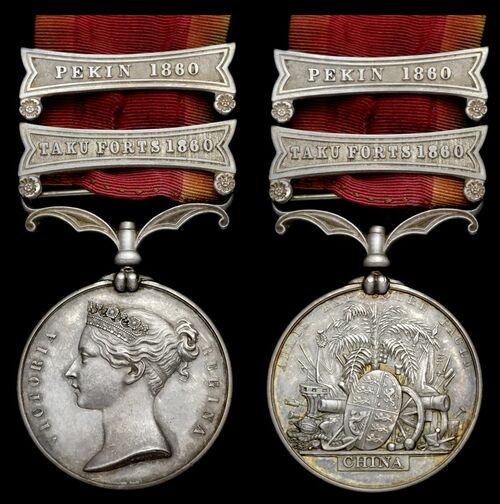
Auction: 23001 - Orders, Decorations and Medals
Lot: 246
The Second China Medal awarded to Lieut. G. F. Dowdeswell, 11th Bengal Cavalry (Probyn's Horse)
China 1857-60, 2 clasps, Taku Forts 1860, Pekin 1860 (Lieut. G. F. Dowdeswell, 11th Bengal Cavy.), officially impressed naming, nearly extremely fine
Ex-Ritchie Collection, March 2005.
George Francis Dowdeswell, a native of Redmarley, Worcestershire was born in 1829, the son of George Dowdeswell, the Chief Secretary to the Government of India and a member of the Supreme Council of India.
Educated at Eton College, he went up to Magdalene College, Cambridge and was admitted to Lincoln's Inn in November 1850. Quite what prompted him to pursue the Army as an alternative career is not known but he became an Ensign without purchase in the 89th Regiment in May 1855, being advanced to Lieutenant in 1857 and appointed one of twelve additional Officers with the 1st Regiment of Sikh Irregular Cavalry (otherwise styled the 11th Bengal Cavalry or Probyn's Horse) on 9 February 1860, while on foreign service in China.
The 11th Bengal Cavalry was originally formed as Wale's Horse by Captain Frederick Wale on 1 August 1857, during the Great Revolt of 1857. Initially stationed at Lucknow, Captain Wale was succeeded by Major Dighton Probyn V.C., after the former was killed by the rebels while leading the unit on 1 March 1858. The Regiment was sent to China in 1860, where it participated in the Second Opium War.
The 1st Sikh Cavalry (Probyn's Horse) consisted of 17 Officers, 446 men and 433 horses. Service overseas was voluntary and each man was asked if he was prepared to go - all agreed. They marched from Lucknow to the railhead at Ranigani (some 600 miles in 18 days) embarking on 1 April for Hong Kong. The expedition arrived at Odin Bay and landed on 1 August.
Sharing in the actions on the 3,12 and 14 August around Sinho, Probyn's Horse were armed with the lance for the first time and were up against Tartar cavalry armed with bows and arrows. Their casualties were two Officers, two Sergeants and two other-ranks wounded.
The advance to Peking, some 100 miles from the Taku Forts, resumed on 8 September, in another action during the advance, Probyn's Horse played a major role:
'Chinese cavalry hovered in large masses on our entire left flank, so that Sir J Michel was unable to perform the flank movement that had been intended, until the 1st Sikh Cavalry had, by a brilliant charge, discomfited the Tartar Horse'.
This enabled the Allies to advance and drive the enemy back for some miles; Probyn's Horse suffered six more wounded. Another fight at Pa-li chiao involved a cavalry charge which drove the enemy back to within 6 miles of Peking. The British entered Peking on 24 October 1860 under Lord Elgin and put on a show of strength with a parade. The Emperor's fabulous Summer Palace was sacked and burned, although this is not necessarily surprising as there was great anger at the way British and French envoys had been tortured to death over four days. The force stayed on into 1861 and did not leave until the autumn. The cavalry embarked at Taku at the end of November, the Regiment losing 15 horses on the way home due to stormy weather. The bravery of the Indian troops impressed everyone involved and Probyn's Horse were said to have 'performed their work most admirably. On more than one occasion they successfully charged a vastly superior force of the enemy's cavalry.'
Following the return of Probyn's Horse from China in early 1861, he remained with the unit after the reduction in establishment to seven Regimental officers until January 1865. The Regimental Lists show that he was on leave in 1863 and did not take part in the Umbeyla campaign.
Dowdeswell retired by sale of his commission in May 1866; that same year he was called to the Bar, practised as a Barrister, and died on 5 October 1891 at Kingsholm Lodge, Gloucester.
The Gloucestershire Archives hold a series of personal papers and correspondence, which include letters referring to accusations of dishonesty [D4453/Box 2/3, refers].
Subject to 20% VAT on Buyer’s Premium. For more information please view Terms and Conditions for Buyers.
Sold for
£700
Starting price
£320




